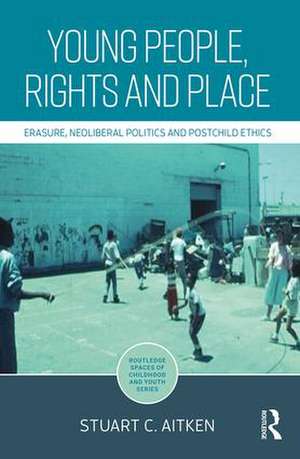Young People, Rights and Place: Erasure, Neoliberal Politics and Postchild Ethics: Routledge Spaces of Childhood and Youth Series
Autor Stuart Aitkenen Limba Engleză Hardback – 23 mai 2018
Armed initially with theoretical concerns about the construction of children through the political status quo and the ways youth rights are spatially segregated, the book begins with a disarmingly simple supposition: Young people have the right to make and remake their spaces and, as a consequence, themselves. This book de-centers monadic ideas of children in favor of a post-humanist perspective, which embraces the radical relationality of children as more-than-children/more-than-human. Its empirical focus begins with the struggles of Slovenian Izbrisani (‘erased’) youth from 1992 to the present day and reaches out to child rights and youth activists elsewhere in the world with examples from South America, Eastern Europe and the USA. The author argues that universal child rights have not worked and pushes for a more radical, sustainable ethics, which dares to admit that children’s humanity is something more than we, as adults, can imagine.
Chapters in this groundbreaking contribution will be of interest to students, researchers and practitioners in the social sciences, humanities and public policy.
| Toate formatele și edițiile | Preț | Express |
|---|---|---|
| Paperback (1) | 386.81 lei 6-8 săpt. | |
| Taylor & Francis – 14 aug 2020 | 386.81 lei 6-8 săpt. | |
| Hardback (1) | 990.55 lei 6-8 săpt. | |
| Taylor & Francis – 23 mai 2018 | 990.55 lei 6-8 săpt. |
Preț: 990.55 lei
Preț vechi: 1207.98 lei
-18% Nou
Puncte Express: 1486
Preț estimativ în valută:
189.71€ • 195.45$ • 158.92£
189.71€ • 195.45$ • 158.92£
Carte tipărită la comandă
Livrare economică 24 februarie-10 martie
Preluare comenzi: 021 569.72.76
Specificații
ISBN-13: 9781138697720
ISBN-10: 1138697729
Pagini: 172
Ilustrații: 14 Halftones, black and white; 14 Illustrations, black and white
Dimensiuni: 156 x 234 x 11 mm
Greutate: 0.39 kg
Ediția:1
Editura: Taylor & Francis
Colecția Routledge
Seria Routledge Spaces of Childhood and Youth Series
Locul publicării:Oxford, United Kingdom
ISBN-10: 1138697729
Pagini: 172
Ilustrații: 14 Halftones, black and white; 14 Illustrations, black and white
Dimensiuni: 156 x 234 x 11 mm
Greutate: 0.39 kg
Ediția:1
Editura: Taylor & Francis
Colecția Routledge
Seria Routledge Spaces of Childhood and Youth Series
Locul publicării:Oxford, United Kingdom
Public țintă
Postgraduate and UndergraduateCuprins
1. The postchild and the law thing 2. Locating young people's rights 3. Play, erasure, and sustainable ethics 4. Codifying state erasure in post-independence Slovenia 5. Youth movement rights 6. Re-thinking the presence and protests of young people 7. Sustaining young people through relational ethics
Notă biografică
Stuart C. Aitken is June Burnett Chair and Distinguished Professor of Geography at San Diego State University. His research interests include critical social theory, qualitative methods, children, families and communities. Stuart has worked with the UN on child rights, labor and migration issues. His previous books include The Ethnopoetics of Space: Young People’s Engagement, Activism and Aesthetics (2016), The Fight to Stay Put (2013), Young People, Border Spaces and Revolutionary Imaginations (2011), Qualitative Geographies (2010), The Awkward Spaces of Fathering (2009), Global Childhoods (2008), Geographies of Young People (2001), Family Fantasies and Community Space (1998), and Place, Space, Situation and Spectacle (1994). He has published over 200 articles in academic journals as well as in various edited book collections and encyclopedias. Stuart is past co-editor of The Professional Geographer and Children’s Geographies.
Descriere
Concern is growing about children’s rights and the curtailment of those rights through the excesses of neoliberal governance. This book discusses children’s spatial and citizenship rights, and the ways young people and their families push against diminished rights.This book de-centers monadic ideas of children in favor of a post-humanist perspective, which embraces the radical relationality of children as more-than-children/more-than-human. Its empirical focus begins with the struggles of Slovenian Izbrisani (‘erased’) youth from 1992 to the present day and reaches out to child rights and youth activists elsewhere in the world with examples from South America, Eastern Europe and the USA.














